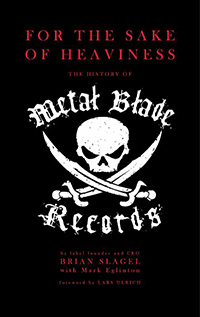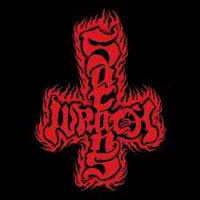 For The Sake of Heaviness: The History of Metal Blade Records
For The Sake of Heaviness: The History of Metal Blade Records
by Brian Slagel (BMG)
By Mike Delano
Heavy metal is associated with a lot of extreme behavior, from church burnings to Sunset Strip debauchery to biting heads off of bats. So it’s funny to think that the story of one of metal’s longest-running and most respected record labels isn’t peppered with tales of coke-fuled revelry or Satanic rituals. In fact, it’s pretty much the opposite.
For The Sake of Heaviness: The History of Metal Blade Records, written by label founder Brian Slagel, is just about old fashioned hard work and a love for heavy metal. That may be a bummer for anyone looking for stories along the lines of Vanilla Ice being dangled from a balcony, but it’s an interesting look at where a singular vision can take you if back it up with a tireless work ethic.
Slagel talks about growing up in the seventies in Los Angeles area and shares something all metalheads can relate to: that one album that opened the door to a lifelong love of heavy music. For him, it was Deep Purple’s Machine Head. I had the same experience with Van Halen’s debut, and then Blizzard of Ozz turned me into a lifer. For Slagel, Deep Purple opened the door and then Iron Maiden kicked it down. He was hooked, and along with his job at a record store, his fanzine and a couple of like-minded friends (one of whom happened to be Lars Ulrich), he started making his presence felt in the LA metal scene.
His growing influence and rolodex led to him assembling the legendary Metal Massacre compilation series and eventually the start of Metal Blade. Things really start rolling once he starts getting rising stars like Armored Saint, Voivod and even Slayer on the label, and also punk acts like D.R.I. and Corrosion of Conformity on a Metal Blade sub-label named Death Records.
Even as a “one-man record label” in a non-air conditioned room in his mom’s house, Slagel is as happy as can be devoting every waking hour to metal and promoting the LA scene. As the years roll on and metal experiences its rise and fall from prominence in the ‘80s and early ‘90s, he talks about the painful transition from vinyl to CD and an alliance with Warner Bros. Records. Metal Blade’s association with a major label produces some fun stories about digging through the company’s vaults for classic material and ending up on the ground floor of grunge with Alice in Chains and Mother Love Bone. (And, most memorably, how Courtney Cox may have been flirting with Cannibal Corpse’s Chris Barnes of the set of Ace Ventura: Pet Detective.)
After enduring the much-maligned metal period of the late ‘90s, Slagel finds his energy renewed with the ascendence of metalcore in the 2000s from the likes of As I Lay Dying and Unearth. The modern shape of Metal Blade starts to take shape as well, as The Black Dahlia murder, Whitechapel, Amon Amarth and Behemoth find their way to the label. And while the label continues to stay truer than true to its metal roots, the book details some fascinating connections the label makes with the sports and comedy worlds, as well as with celebrity chef Chris Santos, who launched his Metal Blade-affiliated label Blacklight Media last year with a great debut record from Good Tiger.
Throughout each chapter, you really get the sense that Slagel’s love of heavy metal is the driving force behind his success. Not fame, not money, not success at any cost, but a genuine desire to share the music he loves with others. The key might be a passage early in the book when he becomes disheartened that many of the local bands he supports never make it past playing local venues. He takes that disappointment to heart and builds a label where bands can have their music heard far beyond the confines of their hometown. He goes to all that effort not because he thinks he’s found a pot of gold that will rake in sales, but because he remembers what it meant to him when heavy music reached him in the 70s. Later in the book, when the business aspects of the label are wearing him down, he’s rejuvenated not by a big signing or cash flow, but by seeing Iron Maiden and Dio perform in London.
Nowadays, even though the physical music products that Slagel used to build the label are all but nonexistent in a world of streaming and downloads, the hard work he put into making Metal Blade a trusted name becomes even more important. Having access to any music at any time means there is a lot for your average metalhead to sift through, but seeing the Metal Blade name associated with a band is as good as a guarantee that it’s the real deal, and this book shows the long road it took to make that a reality.
(metalblade.com)



